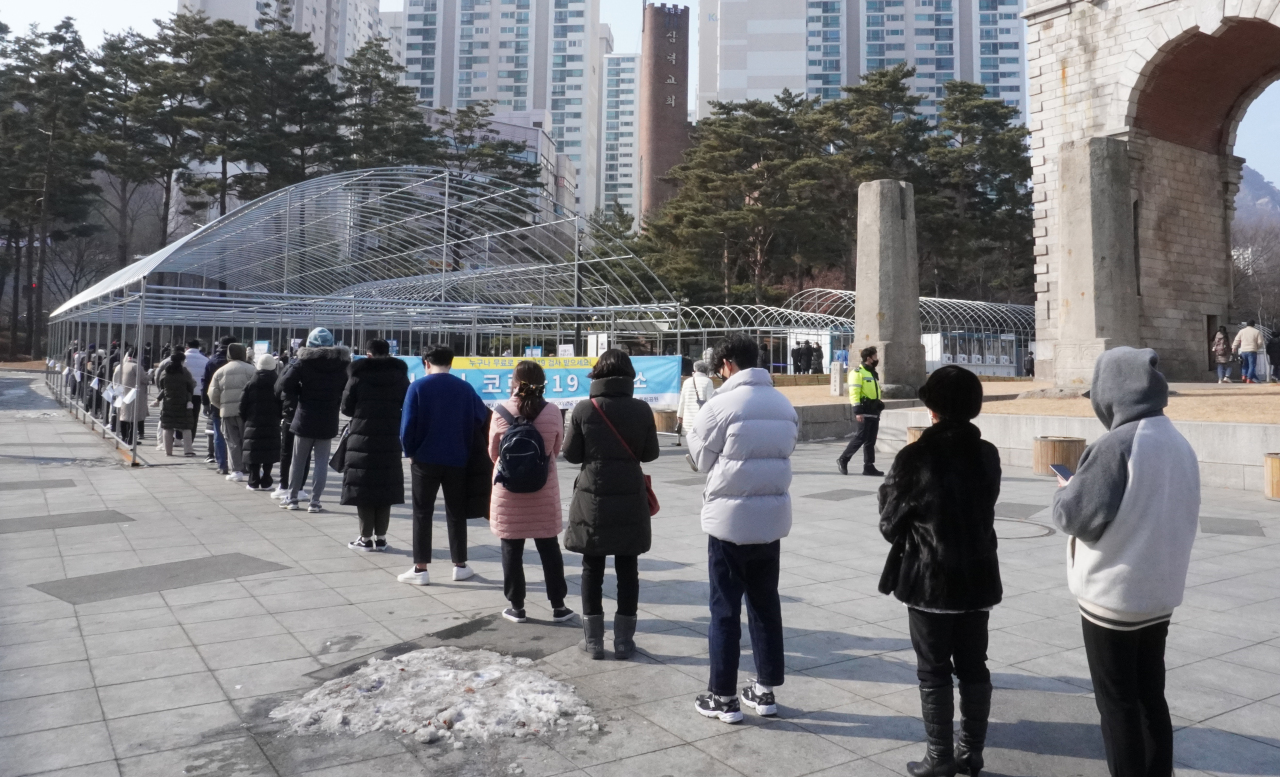Moon calls for swift shift to new response measures to cope with omicron
By YonhapPublished : Jan. 24, 2022 - 13:39

President Moon Jae-in on Monday instructed the government to swiftly shift to new response measures to cope with the spread of the omicron variant, warning the nation could see a surge in infections in the short term.
"The spread of omicron is very fast, making it the dominant strain, and the number of confirmed cases could surge in a short period of time," Moon said, according to Park Soo-hyun, senior presidential secretary for public communication.
Moon urged the government to "swiftly switch to the omicron response system that the government has preemptively prepared," Park said.
Moon also asked people to wear face masks, get vaccinated and refrain from traveling during the Lunar New Year holiday. This year's Lunar New Year falls on Feb. 1, and the holiday lasts until Feb. 2.
Moon also said the government should let the public know about the omicron response system in detail.
Moon, who returned home Saturday from an eight-day trip to the United Arab Emirates, Saudi Arabia and Egypt, was working from home until Tuesday in line with the government's containment guidelines, the presidential office said.
Earlier in the day, the government said the detection rate of the omicron variant had reached 50.3 percent as of last week, meaning the omicron has become the dominant COVID-19 virus strain in South Korea.
As daily coronavirus cases stayed above 7,000 for the third straight day Monday, the authorities are expected to shift to a new medical response system as planned in order to handle the pandemic in a flexible manner.
Under the new system, rapid antigen tests will be introduced at COVID-19 testing centers to produce faster results, while polymerase chain reaction (PCR) tests will be reserved for high-risk groups. (Yonhap)
"The spread of omicron is very fast, making it the dominant strain, and the number of confirmed cases could surge in a short period of time," Moon said, according to Park Soo-hyun, senior presidential secretary for public communication.
Moon urged the government to "swiftly switch to the omicron response system that the government has preemptively prepared," Park said.
Moon also asked people to wear face masks, get vaccinated and refrain from traveling during the Lunar New Year holiday. This year's Lunar New Year falls on Feb. 1, and the holiday lasts until Feb. 2.
Moon also said the government should let the public know about the omicron response system in detail.
Moon, who returned home Saturday from an eight-day trip to the United Arab Emirates, Saudi Arabia and Egypt, was working from home until Tuesday in line with the government's containment guidelines, the presidential office said.
Earlier in the day, the government said the detection rate of the omicron variant had reached 50.3 percent as of last week, meaning the omicron has become the dominant COVID-19 virus strain in South Korea.
As daily coronavirus cases stayed above 7,000 for the third straight day Monday, the authorities are expected to shift to a new medical response system as planned in order to handle the pandemic in a flexible manner.
Under the new system, rapid antigen tests will be introduced at COVID-19 testing centers to produce faster results, while polymerase chain reaction (PCR) tests will be reserved for high-risk groups. (Yonhap)








![[Today’s K-pop] BTS pop-up event to come to Seoul](http://res.heraldm.com/phpwas/restmb_idxmake.php?idx=644&simg=/content/image/2024/04/17/20240417050734_0.jpg&u=)
![[Graphic News] More Koreans say they plan long-distance trips this year](http://res.heraldm.com/phpwas/restmb_idxmake.php?idx=644&simg=/content/image/2024/04/17/20240417050828_0.gif&u=)







![[KH Explains] Hyundai's full hybrid edge to pay off amid slow transition to pure EVs](http://res.heraldm.com/phpwas/restmb_idxmake.php?idx=652&simg=/content/image/2024/04/18/20240418050645_0.jpg&u=20240419100350)

